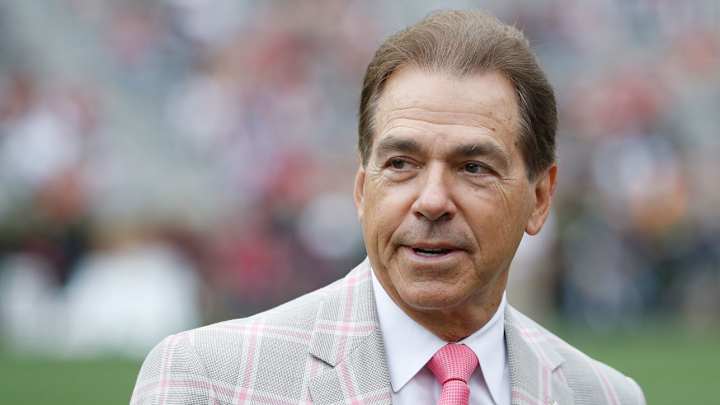Nick Saban: NCAA Turning Into 'Free Agency' with Increase in Transfer Waiver Approvals

Alabama's Nick Saban said NCAA has become "very liberal" in granting waivers to transfer players, which makes them immediately eligible to play for their new teams. Saban added that the recent increase in approvals is turning the college football scene into "free agency."
At SEC media days in Birmingham, Ala., Saban said that the transfer portal itself, which was introduced in 2018, is not a bad thing but took issue with the number of waivers given to players who enter and transfer programs.
"I think the spirit of the transfer portal in and of itself is a positive thing for players," Saban said. "You know, I think when we started with the transfer portal, it was a mechanism for players to be able to say I'm transferring, so everybody knows that I'm transferring, so if that creates opportunities for me to go different places, then that's a good thing for the player."
He continued: "The issue with the transfer portal is we've gotten very liberal in giving people waivers, so, when we do that, it becomes free agency, which I don't think is good for college football. I don't think it's good for fans."
The six-time National Championship coach added that if there is going to be a transfer portal, the one-year sit-out period should be made mandatory.
"So, in my opinion, if we're going to have a transfer portal that's good for the players, then we ought to have a rule that says, regardless of what happens when you transfer, you have to sit out a year," Saban said. "And now we have, I don't know–at one point in time there were 65 waivers that were given in a year. So everybody's expectation is I can transfer and get a waiver. We make commitments to players for four years. They make commitments to us to be in our program. It may not work out for everybody and they may have a better opportunity someplace else, but if they have to sit out for a year, it would be a consequence for them in terms of their commitment."
Waivers are typically given for family hardship situations but recent cases, including those of Miami quarterback Tate Martell and former Georgia signal-caller Justin Fields' approval to play this season for Ohio State, have been granted on different grounds. New NCAA transfer guidelines include a provision for undergraduate transfers which states that a player may not have to spend one year-in-residence before taking the field for their new team if "the transfer is due to documented mitigating circumstances that are outside the student-athlete’s control and directly impact the health, safety and well-being of the student-athlete."
Martell's appeal for immediate eligibility was expected to focus on a number of factors, including last season’s coaching staff turmoil in Columbus in what would be Urban Meyer’s final year on the sidelines, while Fields requested a waiver based on an incident in which a Bulldogs baseball player yelled a racial slur in reference to him during a game, and upon arrival in Columbus he was cleared to compete immediately. The player's comments were argued to be mitigating circumstances for Fields and were a key part of the highly-touted quarterback's waiver request, which was argued by attorney Thomas Mars, who also helped Michigan quarterback Shea Patterson receive approval on his waiver for eligibility last season, along with five other Ole Miss players last season.
